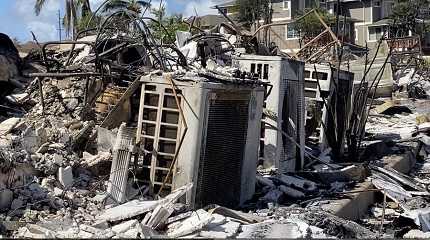
HONOLULU, the United States, Aug. 16 (Xinhua) -- As rescue workers continue looking for those missing in the deadly wildfires on the Hawaiian island of Maui, real estate investors, mostly from the American mainland, have seen an opportunity to cash in on the disaster for land development, triggering anger among local Native Hawaiians.
The wildfires that broke out last Tuesday and razed Maui have left 106 people dead and more than 1,000 people missing as of Tuesday, becoming the deadliest in the United States in over a century.
The fires also damaged or destroyed more than 2,000 structures, of which 80 percent were residential homes, authorities said.
However, since the fires began, real estate developers have approached the survivors whose properties were damaged in the blazes, according to social media posts and media reports.
Tammy Kaililaau, a Maui resident, told USA Today that the home she had lived in for 20 years was burned to the ground. Within a week, she got a Facebook message from someone in real estate.
Mark Stefl, a 67-year-old fire survivor in the historic town of Lahaina, told the same outlet that developers had approached him, and the offer felt like a hit while he was down.
Another resident Richy Palalay told the Associated Press that he was worried that investors would seize the opportunity to pay a lower price for the land locals lived on to build expensive resorts.
"I'm more concerned of big land developers coming in and seeing this charred land as an opportunity to rebuild," said Palalay.
Many residents are concerned that their land would slip into the hands of affluent outsiders. Some have turned to social media to warn each other of such purchase inquiries or potential scams.
Last week, the Federal Trade Commission cautioned that people affected by wildfires on Maui could fall prey to scammers who typically target victims after a disaster.
Hawaii Governor Josh Green's office said in a news release on Monday that concerns were rising over the threat of potential scams because "residents are being approached about selling fire-damaged home sites by people posing as real estate agents who may have ill intent."
The governor said he had asked the state's attorney general to consider imposing a moratorium on the sales of damaged or destroyed properties on Maui.
Acknowledging that laws do not restrict who can buy properties in Hawaii, Green said, "We can do it deliberately during a crisis."
"So for my part, I will try to allow no one from outside our state to buy any land until we get through this crisis and decide what Lahaina should be in the future," he added.
More Native Hawaiian community leaders showed their fury against the greedy attempts.
"The fires of today are in part due to the climate crisis, a history of colonialism in our islands, and the loss of our right to steward our 'aina and wai' (land and water). The same western forces that tried to erase us as a people now threaten our survival with their destructive practices," a statement from Carmen Lindsey, chairwoman of the Office of Hawaiian Affairs, read.
"It is very disrespectful to those who lost loved ones and to Hawaii as a whole to make offers to purchase property at rock-bottom prices. It is disrespectful to even bring it up at this time, at any price," Mona Bernardino, an attorney and Native Hawaiian leader, told Xinhua.
"The pain is real for all of us in Hawaii," she said. "Hawaii is not for sale. Don't even begin to look here for economic opportunity. Our residents and community come first. We will rebuild Lahaina in our way, on our time schedule."




